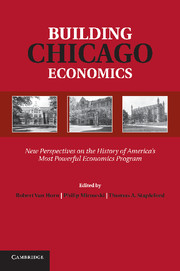 Building Chicago Economics
Building Chicago Economics Milton Friedman, Institutionalism, and the Science of History
from Part One - Economics Built for Policy: the Legacy of Milton Friedman
Published online by Cambridge University Press: 05 November 2011
As economics pushes on beyond “statics,” it becomes less like science, and more like history.
– Sir John R. Hicks , xiConventional wisdom would place early institutional economics and the postwar Chicago School on opposite ends of any methodological spectrum. Prominent faculty and graduates from postwar Chicago have derided institutional economics not merely as incorrect but as actually devoid of content. Thomas Sowell characterized it as “half economics, half sociology, and all mush” (Sowell , 788); Ronald Coase claimed it “had nothing to pass on except a mass of descriptive material waiting for a theory, or a fire” (Coase , 230); and George Stigler found it vacuous beyond “a stance of hostility to the standard theoretical tradition” (Kitch , 170).
Nonetheless, recent scholarship has softened this superficially sharp contrast. In the first place, institutionalism encompassed a diverse range of approaches (Rutherford ), and postwar Chicago economists have been noticeably less critical of at least one prominent strand: the quantitative analysis associated with Wesley C. Mitchell, the National Bureau of Economic Research (NBER, cofounded by Mitchell), and some aspects of the Robert Brookings Graduate School (forerunner of the Brookings Institution). Stigler expressed grudging respect for Mitchell, and Milton Friedman likewise concluded that Mitchell was “not as empty of content as most of the [institutionalists]” (Kitch , 170, 171). In fact, Friedman spoke quite positively about Mitchell in a lengthy posthumous assessment in 1950 in which he argued for viewing Mitchell as an “economic theorist” (Friedman ), a significant label because the most common objection to institutional economics from postwar Chicago was its alleged neglect of theory (e.g., Kitch , 169–171).
To save this book to your Kindle, first ensure [email protected] is added to your Approved Personal Document E-mail List under your Personal Document Settings on the Manage Your Content and Devices page of your Amazon account. Then enter the ‘name’ part of your Kindle email address below. Find out more about saving to your Kindle.
Note you can select to save to either the @free.kindle.com or @kindle.com variations. ‘@free.kindle.com’ emails are free but can only be saved to your device when it is connected to wi-fi. ‘@kindle.com’ emails can be delivered even when you are not connected to wi-fi, but note that service fees apply.
Find out more about the Kindle Personal Document Service.
To save content items to your account, please confirm that you agree to abide by our usage policies. If this is the first time you use this feature, you will be asked to authorise Cambridge Core to connect with your account. Find out more about saving content to Dropbox.
To save content items to your account, please confirm that you agree to abide by our usage policies. If this is the first time you use this feature, you will be asked to authorise Cambridge Core to connect with your account. Find out more about saving content to Google Drive.